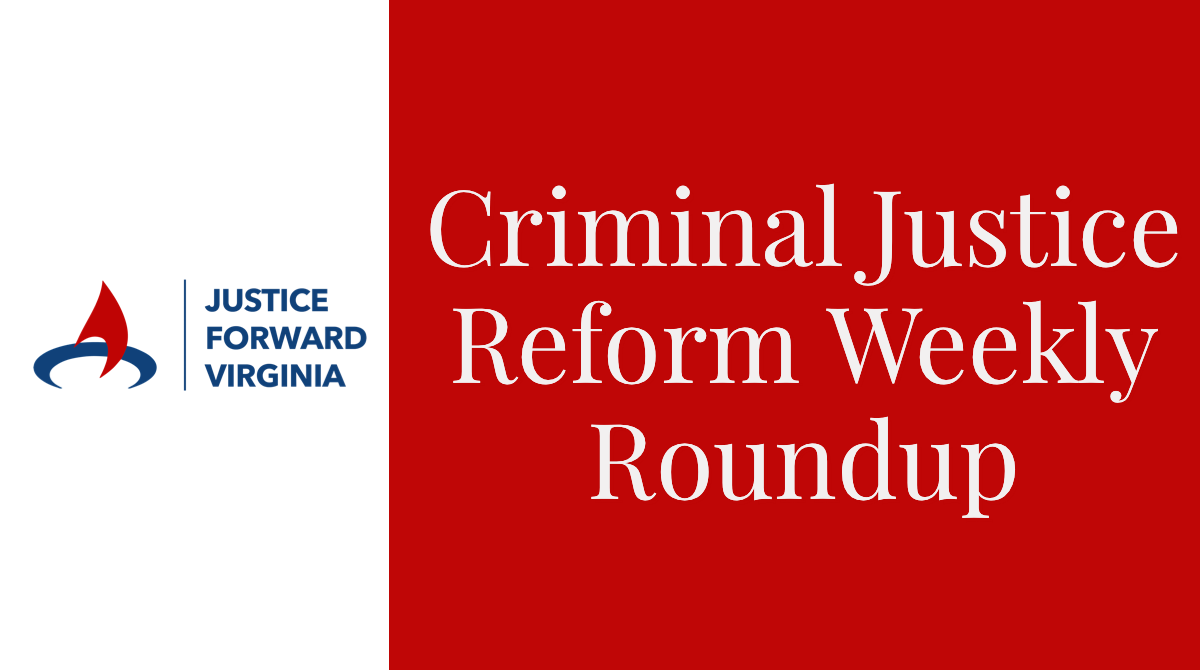Criminal Justice Reform Weekly Roundup - August 7, 2020
Justice Forward Virginia Weekly News Roundup
State Updates
Virginia Legislature Special Session convenes on August 18, 2020
In the third and final hearing hosted by the Virginia House Courts of Justice and Public Safety Committees on Police and Criminal Justice Reform, speakers discussed qualified immunity, civilian review boards, over policing (particularly as it related to drug offenses), choke-holds and no-knock warrants, among other topics. Full video and recap is available here. [Blue Virginia]
Virginia plans to address pretextual traffic stops in the upcoming special session. Areas of emphasis are likely to include stops for loud exhaust, window tint, objects dangling from rearview mirrors, and minor equipment violations. Del. Mark Levine (D-45) explained, “there’s a long history of police stopping someone for driving while Black or driving while Black in the wrong neighborhood or driving a car that doesn’t look like it belongs there . . . [the police] use these pretexts to ask for a search, and sometimes these things can lead to very deadly outcomes.” [Connection]
Ahead of this month’s special session, Senate Democrats have introduced an omnibus police reform bill. The bill contains a series of new reforms, including banning no-knock warrants and chokeholds, establishing statewide standards for police officers, and banning departments from purchasing military equipment. [The Washington Post]
The General Assembly’s Joint Subcommittee to Study Mental Health met to discuss the $135 million, originally allocated to new mental health programs, that was placed on hold as tax revenues are expected to decline and COVID-19 costs rise. The funding is part of the $154 million that had been put towards programs to help those in crisis avoid hospitalization and reduce the instances of re-hospitalization. [The News and Advance]
Earlier this summer, the Office of the Attorney General, the ACLU of Virginia and Charlottesville attorney Elliott Harding and Gov. Ralph Northam, Secretary of Public Safety Brian Moran, among other state officials reached a settlement regarding medically vulnerable people in Virginia Department of Corrections custody during the COVID-19 pandemic. As part of the settlement, the Department is required to disclose the number of individuals that have been reviewed for early release to avoid exposure to COVID-19, as well as the number that are ultimately granted an early release. [ACLU of Virginia]
As of this week, 1,032 people have been reviewed for early release from Virginia Department of Corrections facilities following the ACLU settlement; another 36 people were released this week, making a total of 789 medically vulnerable people who have been released in response to the COVID-19 pandemic. [ACLU of Virginia]
A coalition, including The National Association of Criminal Defense Lawyers (NACDL), the Virginia Association of Criminal Defense Lawyers (VACDL), the ACLU of Virginia, Justice Forward Virginia, and the Legal Aid Justice Center (LAJC), announced the launch of the Virginia Redemption Project. The project will train lawyers to assist incarcerated individuals submit petitions to the governor for executive clemency in the wake of the COVID-19 pandemic and its disproportionate impact on those in prison facilities. [NACDL] For more information on how to volunteer see the NACDL website here.
Local Updates
Richmond Advocacy group calls for the Virginia General Assembly to pass legislation that allows meaningful civilian oversight of law enforcement with subpoena and disciplinary power. [Richmond Transparency and Accountability Project]
The Justice Department has proposed a consent decree that would require the Hampton Roads Regional Jail in Portsmouth to implement new policies and procedures to improve the facility’s discriminatory medical and mental health care. The consent decree is the result of a multiyear investigation that was launched after Jamycheal Mitchell died of heart failure in the prison in 2015. Prior to arriving at the prison, Mr. Mitchell was to be admitted to a state mental health facility, but was sent to the jail instead as the result of a clerical error. The Department subsequently stated it believed the conditions of the health services and housing in the jail amounted to discrimination against inmates with mental health disabilities, violating the Americans with Disabilities Act. [Virginia Lawyers Weekly]

